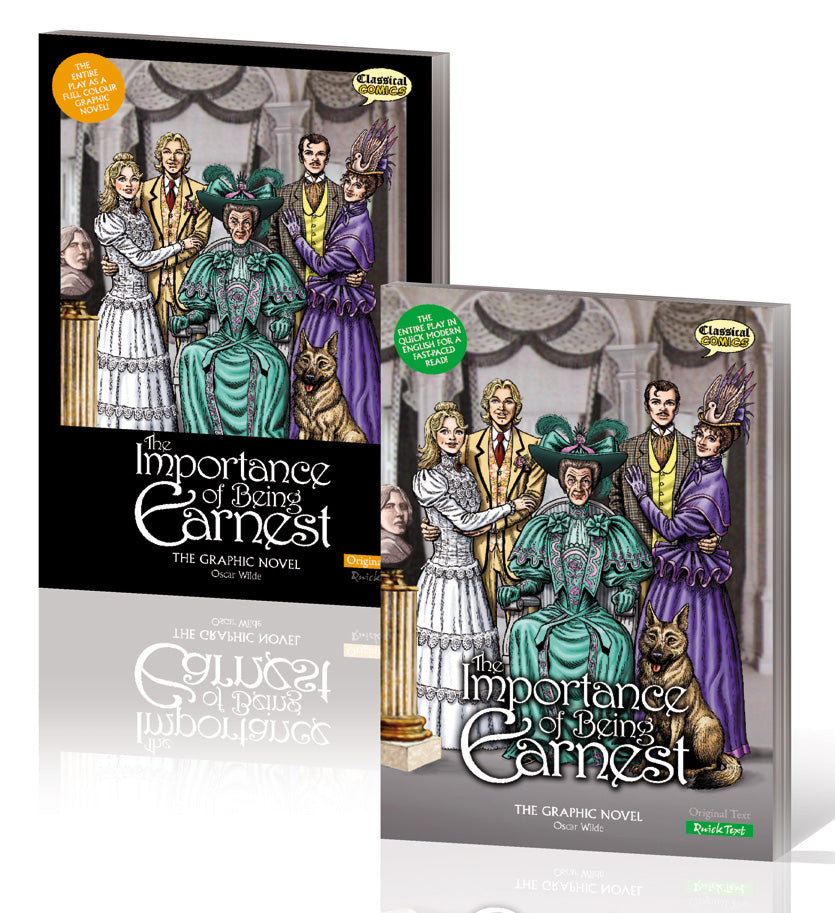“There is no such thing as a moral or an immoral book. Books are well written, or badly written.” Oscar Wilde
The Importance of Being Earnest established Oscar Wilde as a leading playwright. It was originally written in 1895 in four-acts. Wilde was asked by George Alexander, the theatre manager at the St. James’s Theatre where his play opened, to reduce his play from four acts to three to be consistent with conventional farces showing at that time. (These farces were usually made of three acts).
“I regard the theatre as the greatest of all art forms, the most immediate way in which a human being can share with another the sense of what it is to be a human being.”
Oscar Wilde
In doing so, Wilde made his play more commercial and his reworked three-act version is the one that is now commonly performed and widely accepted as his masterpiece and his most popular comic play.
The Classical Comics graphic novel version of The Importance of Being Earnest is the three-act version.
“It is better to have a permanent income than to be fascinating.” Oscar Wilde
In order to omit an act, Wilde cut down on dialogue, scenes and characters:
Act One
The opening of the play changed very little. Some dialogue between Algernon and Jack was removed. Ernest’s debt, owed to the Willis’s, was originally owed to The Savoy and suggested that Ernest (Jack) was regularly in debt.

Act Two
Many dialogue references to death from Reverend Chasuble were removed which kept the play lighter in tone. The character of Moulton the gardener was removed as well as the character of Grisby (from Grisby and Parker Legal Firm).
Grisby had originally arrived halfway through Act Two to serve a writ for debt on Ernest. Misunderstanding ensued as Algernon was pretending to be Ernest and the debt was, of course, not Algernon’s, but Jack’s. Some editions of the play still contain this omitted scene as an appendix.
An interesting point to note here is that Wilde himself was to be incarcerated in 1895.
Act Three
The original Act Four became part of Act Three. Miss Prism’s dialogue was greatly cut, losing some witticisms. The remaining streamlined three-act play flowed faster and allowed pace and clarity of humour - perhaps this explains its continuing popularity today.

“There is only one thing in life worse than being talked about, and that is not being talked about.” Oscar Wilde
Below is a side-by-side summary of the pros and cons. You could use this to structure a balanced essay, weighing theatrical economy against potential artistic sacrifice:
Reduction of The Importance of Being Earnest from Four Acts to Three:
A Critical Overview
| Advantages | Disadvantages |
|---|---|
| 1. Tighter Structure: The three-act format creates a more focused, streamlined narrative. | 1. Loss of Depth: Some character development and thematic exploration may have been sacrificed. |
| 2. Better Pacing: Speeds up the action and enhances the play's comedic rhythm. | 2. Reduced Supporting Roles: Characters like Miss Prism and Dr. Chasuble may have less narrative space. |
| 3. Enhanced Audience Engagement: A shorter, more direct play keeps the audience’s attention better. | 3. Abrupt Transitions: Cutting scenes may lead to less smooth narrative progression. |
| 4. Practical for Performance: Easier to stage, more commercially viable, especially in Wilde’s time. | 4. Loss of Symmetry: The original four-act structure may have allowed for more thematic balance. |
| 5. Greater Longevity: The concise version is more adaptable for modern audiences and education. | 5. Compromise of Artistic Vision: Wilde may have accepted cuts due to production pressure, not preference. |

